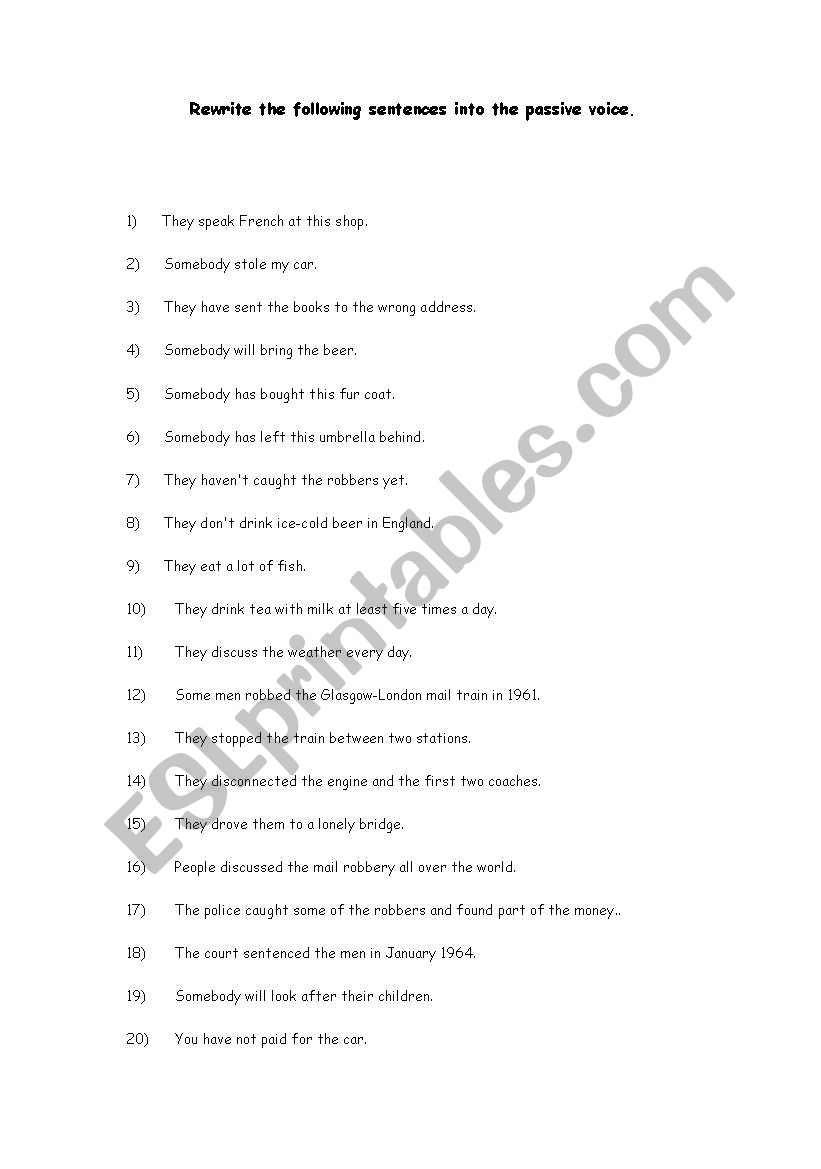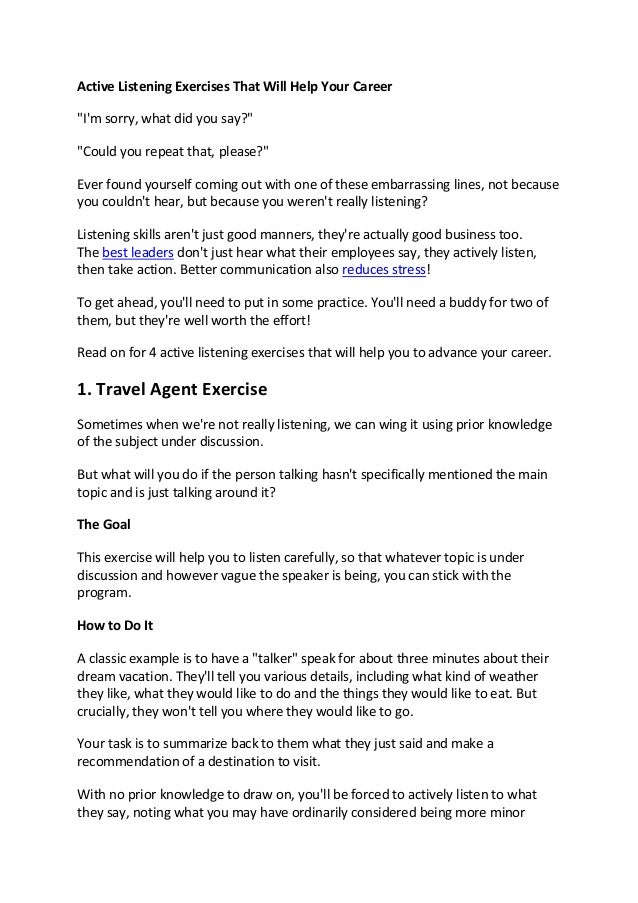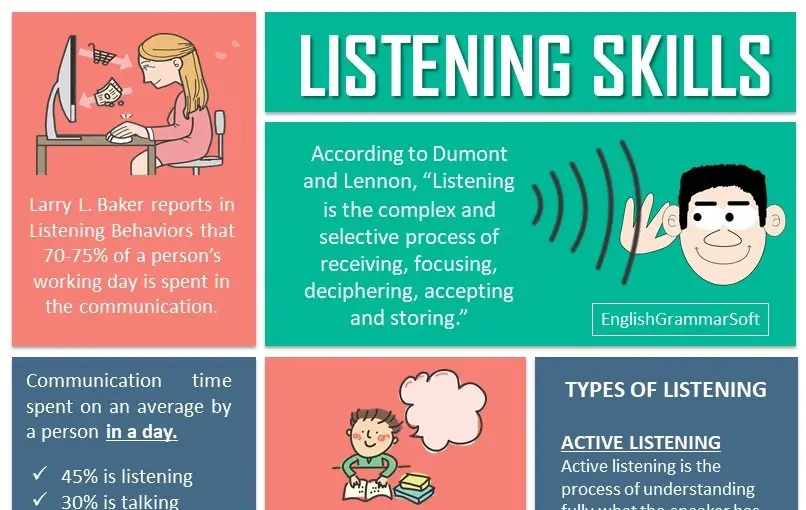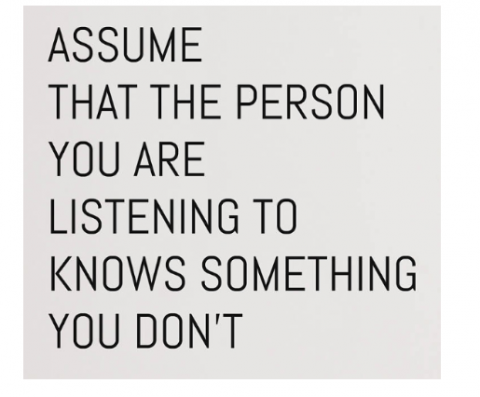
Lesson 2 of 7 - learn to communicate effectively | |
Empathic Listening Practice Try 'Hearing with By Peter K. Gerlach, MSW | |
site intro > course outline, Lesson 2 study guide or links, chat, search, or prior page > here
The Web address of this article is http://sfhelp.org/cx/skills/listen_practice.htm
Active listening helps teachers to build strong communication skills with students. Effective teaches are good listeners and recognize the value of this skill in teaching and guiding students. Purpose: To practice active listening. 1) Explain to the class the skills of paraphrasing and perception checking. Struggling to understand native speakers? These active listening exercises will boost your foreign language skills and help you keep up with any pace.
Updated 01-09-2015
Clicking underlined links here will open a new window. Other links will open an informational popup, so please turn off your browser's popup blocker or allow popups from this nonprofit Web site. If your playback device doesn't support Javascript, the popups may not display. Follow underlined links after finishing this article to avoid getting lost.
This brief YouTube video overviews 'empathic listening'. The video mentions eight lessons in this educational Web site - I've simplified that to seven.:

This is one of a series of articles in Lesson 2 - learn communication basics and seven powerful skills to get more daily needs met more often. Progress with this Lesson depends on simultaneous progress on Lesson 1 - free your resident true Self to guide your personality in calm and conflictual times.
Doing this practice with an open mind can help you learn more about yourself as a listener - alone, and with special adults and kids. To get the most from this practice...
review these basic ideas about the communication skills of awareness and empathic listening, and this brief article on awareness bubbles.
option - try this awareness practice before doing this learning exercise.
read this interesting article by Dr. James Lynch on why listening is good for you,
assess your effectiveness as a listener, and note any ways to improve; and...
compare these ideas about giving other people effective feedback to your way.
Use this practice periodically to help strengthen your ability to “hear with your heart.”
Print two copies of this page, and find a partner who shares your interest in growing communication effectiveness.
Set aside 1at least 30” for this experience, and find a comfortable, undistracted site.
Confirm that each of you is guided by your wise, resident true Self.If not, invest time in freeing your Selves to lead this practice, for best results.
Sit facing each other, with comfortable eye contact. Remind yourselves that your goals are (a) to become more familiar with empathic listening skill, and (b) to practice giving effective feedback.
Consider tape-recording or videoing your practice to expand your learnings. Another valuable learning option is to map your practice soon after you're done.
Practice
When you both feel ready and clear what you're about to do, alternate these practice-roles of speaker and listener:
Speaker
Pick a safe subject you feel some energy about now.
Be you! Forget this is an exercise as much as you can. Talk naturally for 3-5 minutes, expressing your ideas and feelings; then…
Use your awareness skill to give your listening partner constructive, specific feedback on:
The R(espect)-message you got from them as they listened (“I’m 1-up,' “I’m 1-down,' or “we’re equal”), and...
how you got it (words, voice dynamics, and/or nonverbal behaviors);
How clearly you felt (a) heard, (b) understood, and (c) genuinely accepted (vs. judged or ignored) by them - e.g. “On a 1-to-10 scale, I felt...”); Was this 'effective communication' for you?
What you noticed about (a) any changes in your E(motion)-level as you talked together; and (b) your partner's awareness bubble (1-person, 2-person, or no-person) during the practice; And say.....
If you felt interrupted by your partner's restatements of your thoughts and feelings; and...
What you liked about her or his listening style - e.g. eye contact, body posture, voice tone, comments, brevity, attitude, focus, timing, ...; and…
Anything specific you feel would improve your partner's empathic-listening skill.

Listener
Decide to use empathic listening: i.e. consciously choose to put your views, values, and needs aside just now. Recall: listening isn’t (necessarily) agreeing!
Make a silent “Respect check” on how you honestly feel about your partner’s dignity, worth, and needs relative to yours, now - genuine mutual respect, or other. 'Other' may indicate a false self controls you.

Give yourself permission to experiment, feel awkward, and take risks here - try something different! The goal is learning, not being perfect!
Use brief verbal insertions (periodically summarizing the speaker’s thoughts, feelings, and needs) vs. interruptions (shifting to your agenda);
Make at least three or four restatements (“insertions”) of your partner's thoughts and feelings as s/he talks (e.g. 'You felt / thought / needed / saw... “).See these examples.
Avoid commenting or questioning the speaker - just restate what you hear, and watch her / his reactions.
Use awareness skill to factually note the speaker's reaction to each of your restatements without judgment - e.g. 'Yes, and...,'or'No, more like...' Both are win-win.
Notice any inner or outer distractions without judgment. If your partner did something distracting visually or vocally, give them constructive feedback on it.
Hear your partner's feedback without defensiveness - it's a gift!Option: reflect it back, including feelings ('So you feel I could listen better if I maintained steady eye contact.') Ask for clarification or other observations if you need them.
Options: describe...
what you did in this practice (specifically) that was different than your usual listening habits,
how it felt to try empathic listening, and...
what results you got from using it. That’s metatalk!
Identify anything you want to remember from this learning experience. Option: write it down.
When you each feel finished with the first round, change roles and repeat the practice.

Thots / Ideas / Learnings…
Learn More
Take this quiz on communication knowledge alone or with your practice-partner;
Review these articles on communication basics and effective problem solving.
Try these other Lesson-2 skill-practices: awareness / digging down / assertion / metatalk / problem-solving.
Study these questions and answers about effective communication; and...
Consider investing in the Lesson-2 guidebook Satisfactions - 7 relationship skills you need to know (Xlibris.com, 2nd ed., 2010). It integrates the key Lesson-2 articles and worksheets in this Web site.
Pause, breathe, and reflect - why did you read this practice? Did you get what you needed? If not, what do you need? Who's answering these questions - your wise, resident true Self, or 'someone else'?
Active Listening Exercises
Learn something about yourself with this 1-question anonymous poll.
Active Listening Exercises Pdf
Prior page / Lesson 2
Active Listening Exercises For Managers
site intro / course outline / site search / definitions / chat / contact